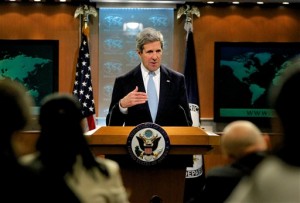North Korea seeks talks with US to ease tensions

Secretary of State John Kerry AP FILE PHOTO
BANDAR SERI BEGAWAN, Brunei— North Korea’s top diplomat said Tuesday that the U.S. must accept its offer for dialogue without preconditions if it wants to ease tensions on the divided Korean Peninsula. He drew a quick rebuttal from his South Korean counterpart, who said the international community has made clear that Pyongyang must give up its nuclear ambitions if it wants better relations.
The Koreas were among 27 nations at the Association of Southeast Asian Nations Regional Forum in Brunei, where the North’s nuclear weapons program was a key topic, along with other hot-button regional issues such as South China Sea territorial disputes. Asia’s largest security forum includes the U.S., North Korea and the four other countries involved in long-stalled nuclear talks on ending North Korea’s nuclear ambitions in return for aid.
U.S. Secretary of State John Kerry said Monday that the U.S., South Korea, Japan and China — North Korea’s chief ally — were “absolutely united” in their insistence on a denuclearized North Korea. Washington says Pyongyang must move in that direction before it will agree to talks, but North Korean Foreign Minister Pak Ui Chun said during the conference Tuesday that it is America that must act.
“The U.S. must accede to our courageous decision and goodwill gesture (to offer talks) without preconditions if it is truly interested in ending the vicious circle of intensifying tension on the Korean Peninsula and safeguarding peace and stability,” Pak said, according to North Korean delegation official Choe Myong Nam.
Pak said that “a touch-and-go situation in which a war can break out anytime is fostered” on the Korean Peninsula, and that U.S. hostility against the North was primarily responsible for that, Choe told reporters. Pak said the U.S. must normalize relations with North Korea and lift sanctions against the country, saying the North Korean nuclear standoff won’t be resolved unless the U.S. changes its tone, according to Choe.
Article continues after this advertisementShortly after Choe spoke, South Korean Foreign Minister Yun Byung-se told reporters that most diplomats at the forum expressed a “very strong message” to the North Korean delegation that Pyongyang must scrap its nuclear program and refrain from launching another provocation.
Article continues after this advertisement“So they must have listened to this message very, very seriously,” he said, speaking in English.
North Korea surprisingly offered to talk with the U.S. and rejoin long-stalled international nuclear disarmament talks last month after weeks of tension following its February nuclear test. The country also recently eased its warlike rhetoric, but has still vowed to bolster its nuclear arsenal, citing what it calls U.S. military threats.
U.S. officials have coolly responded to North Korea’s overtures, and analysts say the impoverished country often calls for talks after raising tensions with provocative behavior in order to win outside concessions.
Kerry on Monday stepped up pressure on the North to abandon its atomic ambitions after meeting with his counterparts from China, South Korea and Japan. He emphasized Washington’s common cause with Beijing, which is North Korea’s longtime ally and main aid provider but has been angered by Pyongyang’s ramping up of tensions. China has supported tightening U.N. sanctions and cracked down on North Korean banking activity.
“China made clear to me they have made very firm statements and very firm steps that they have taken with respect to the implementation of that policy,” Kerry told reporters.
The nuclear disarmament talks — which involve the two Koreas, the U.S., China, Japan and Russia — have been stalled since North Korea quit the negotiations in 2009 to protest international condemnation over a rocket launch.
Yun’s office said Russia’s foreign minister also expressed his opposition to North Korea possessing nuclear weapons when he met with his South Korean counterpart Monday.
On Tuesday, senior North Korean nuclear strategist and First Vice Foreign Minister Kim Kye Gwan left for Russia amid reports that he would discuss how to resume the nuclear talks with Moscow officials. Kim, who served as the country’s top nuclear negotiator, visited China last month and Chinese officials said he expressed his country’s intentions to resume the talks during his visit.
Since the ASEAN security forum includes all members of the six-party talks, it has previously provided a chance to use informal discussions to break stalemates over the nuclear standoff. In 2011, top nuclear envoys from the two Koreas met on the sidelines of the forum in Bali, Indonesia, and agreed to work toward a resumption of the six-nation talks.
But there have been no reports that North Korea had similar talks with the U.S. or South Korea in Brunei. U.S. and South Korean officials have said they have no plans to meet privately with North Korea. Choe said North Korean and U.S. delegates stayed at the same hotel in Brunei but didn’t encounter each other there.
Last month, government delegates of the two Koreas met and agreed to hold senior-level talks on non-nuclear issues, but the plan collapsed due to a dispute who would head each other’s delegation.
The Korean Peninsula officially remains in a state of war because the 1950-53 Korean War ended with an armistice, not a peace treaty, 60 years ago this month. The U.S. keeps 28,500 troops in South Korea as deterrence against potential aggression from North Korea.